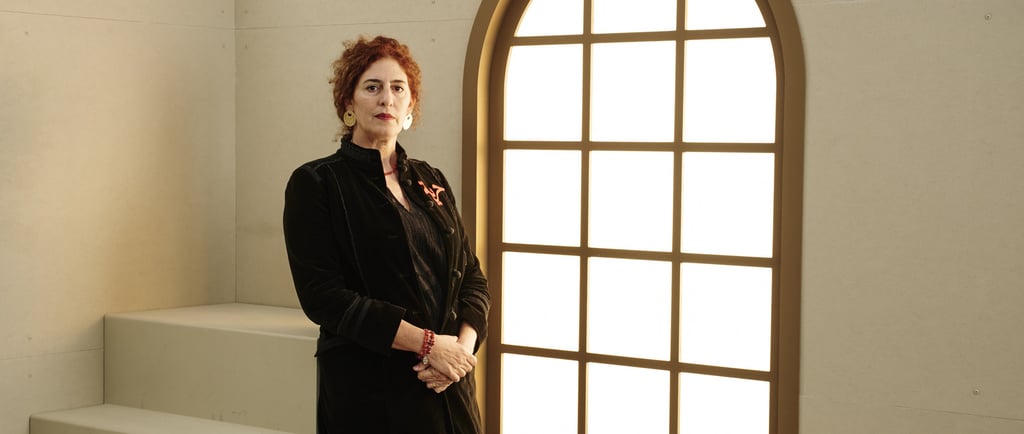Annemarie Jacir Finds the Joy amidst the Struggle in Palestine 36 (EXCLUSIVE)
INTERVIEWS
Farah Sadek
10/31/2025


Annemarie Jacir immediately relaxes the moment I break the ice in Arabic. For both of us, this interview comes after a long period away from home, and because of that connection between us, the conversation quickly sheds any formality. By the time we start talking about Palestine 36, it feels less like an interview and more like a conversation on the nuances and humor that sustain life in the Middle East, a levity Jacir herself says Palestinians hold onto amid struggle. We spoke on the morning of October 17, the day of the London Film Festival premiere of Palestine 36, just a week after a ceasefire was agreed upon in Gaza and only two days before it was seriously violated.
The timing of our conversation could hardly have been more poignant. In this interview, Jacir reflects on the making of her new film, its UK release and festival screenings, and the ways joy can persist even in the midst of pain.
FARAH SADEK: When I posted about this film, many people who are very pro-Palestinian said things like, “I didn’t know that happened,” or “I didn’t realize that part of history.” What do you think audiences were most surprised to learn from the film?
ANNEMARIE JACIR: People were surprised that the British were in Palestine and that they were the ones who really started all of this. Somehow, that part of history has been erased from mainstream awareness. Along with the French, they chopped up our entire region, and so much of what we’re dealing with today is a direct result of that.
SADEK: Of course, during this year’s London Film Festival, there’s a range of Palestinian films being shown. What do you think about that happening now?
JACIR: I think it’s great, but still not enough. It’s never enough. There are so many Palestinian filmmakers working across fiction, non-fiction, experimental, and animation yet we’re still underrepresented at major international festivals.
SADEK: How did you make sure to include Palestinian joy in the film, alongside the struggle?
JACIR: Joy is a big part of our resistance and survival. We fight for life because so much is taken from us every day, so we hold tightly to laughter and to each other. When we were shooting in Palestine, the cinematographer said, “It’s so hard here, yet you’re all laughing and so kind to one another. I’ve never seen anything like it.” For us, that’s survival, but it’s also simply who we are. It’s woven into our stories, our films, our daily lives. Our humor is dark, cynical, and deeply rooted in the absurdity of what we live through, but it’s ours, and it keeps us alive.
SADEK: Can you walk me through how much of the film was actually shot on location in Palestine? Was it all filmed there?
JACIR: The film was meant to be shot entirely in Palestine, and we spent ten months preparing. We restored a village, built vehicles and costumes, everything. After October 7th, all our locations were lost. Alternatives like Morocco, Malta, Greece, and Cyprus were offered, but I refused because this story had to be made in Palestine. We’re a Palestinian crew, and the story belongs to this place.
As the situation worsened, we moved part of production to Jordan, which allowed our team to keep working safely. Yet I held on to key locations like Jerusalem and Jaffa, and eventually we returned, reducing cast and crew to finish the film on site. It was a bittersweet victory but we made it happen against all odds, with pride, but also immense sorrow.
SADEK: Of course, you’ve explored this in many of your projects, but as a Palestinian director, how do you direct your cast and crew on something like this, when they’re the very people living through what the film is about?
JACIR: We were all living the same pain, each affected in our own way. Some stopped watching the news, others disconnected from social media. It was devastating, but it also brought us closer. We supported each other and knew we had to keep going.
The cast faced hard days. We were making a film about a violent period in our history while the violence around us was even worse. The emotions were raw and real, and that’s what you see in the film. We shared a sense of purpose. We have to do this. We will not be erased, we will not be silenced. And we reminded ourselves that we’re not the ones in Gaza. Our friends, families, and colleagues there are still making films, singing, laughing, surviving. We owe it to them to keep going and tell their story.
SADEK: Hiam Abbas’s part in the film was so moving, despite its brevity. What was it like working with her on this project?
JACIR: I’ve admired her work for years, so her appearance in this film felt especially emotional. We first met while working on Ramy, though she wasn’t in the episode I directed. I was immediately struck by her presence and talent and knew I wanted to collaborate with her again.
What she brought to the role of Hanan, the grandmother, was remarkable. She has a warmth and vitality that no one else could have captured. She is a true star, completely without ego, the kind of person who, even if she wasn’t needed on set, would still help the crew. That generosity of spirit shines through in everything she does.
SADEK: How do you foster your collaboration with the Bakri family and their intergenerational work?
JACIR: Saleh [Bakri] and I worked together on his first film, Salt of the Sea. I remember doing an audition and thinking, “Who is this person?” From that moment, we’ve worked together on everything, with Wajib alongside his father, Mohammad.
When I began casting for Palestine 36, I knew Saleh was perfect for Khalid. When he mentioned his sister, Yafa, and suggested I consider her, I scheduled an audition, but didn’t expect much, thinking Saleh was just pushing her. But she was amazing. I couldn’t believe it was her first time acting. She feels everything deeply, much like Saleh, and is completely natural on camera.
It’s in their blood, literally.
SADEK: Can you describe a day, a moment on set, or a scene that was especially meaningful to you?
JACIR: The first day of filming at the train station was unforgettable. After having to start from scratch, the scene in which Karim Daoud Anaya, as Yusuf, stepped off the train at the old Ottoman station finally clicked. I looked around at the extras, the station, Yusuf and everything was alive. It was a misty morning with real trains running, and even a little boy on the train looked like he had stepped straight out of the 1930s. Every detail was perfect. It was pure magic.
SADEK: You included so many different kinds of characters. Yet each of them felt fully realized, with their own life and arc. How did you manage to give every character their own space and story?
JACIR: It was challenging with so many characters, but it was crucial to talk about the farmers, the fallahin, because this was a farmer-led revolt. It nearly succeeded, and the British had no idea how to control it. They managed the cities and classes through diplomacy and commissions, but the countryside was a different story. In our chaos, we were deeply organized, and they didn’t know how to respond. That’s why it was important to show both village and city, exploring class, mistakes, and everything in between. Ultimately, it’s a story about time and how it shaped all of us.
Palestine 36 is now playing in UK cinemas.
